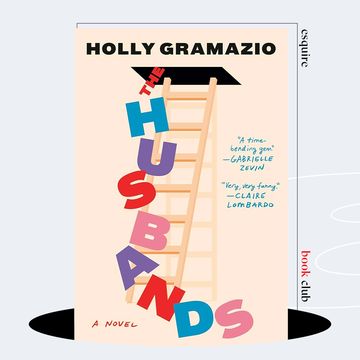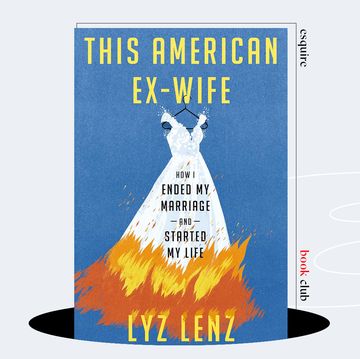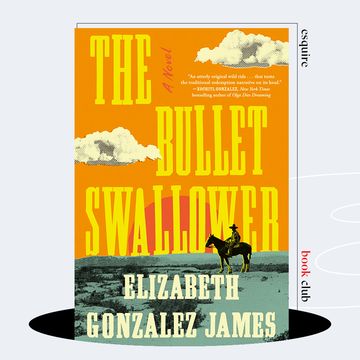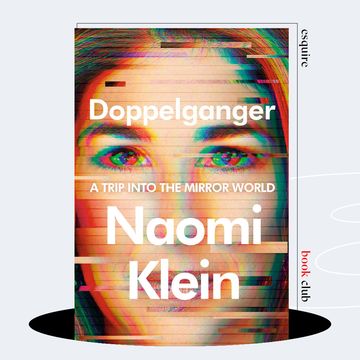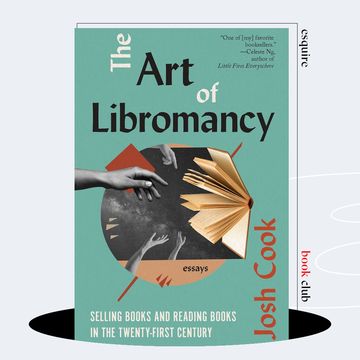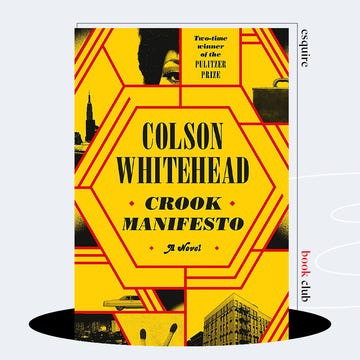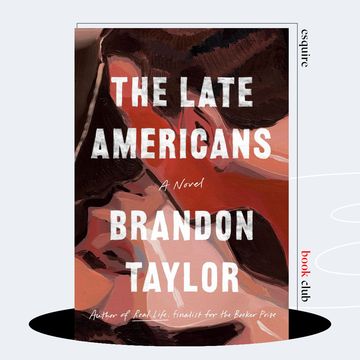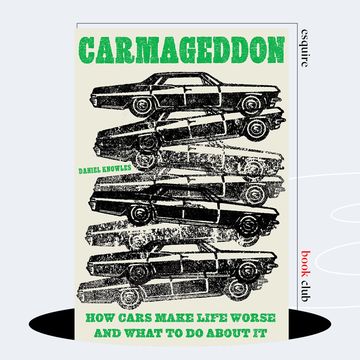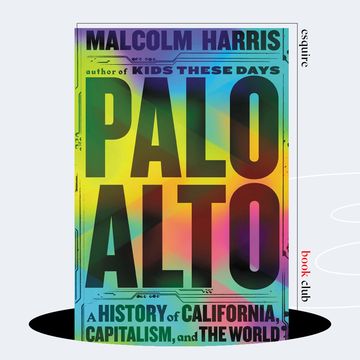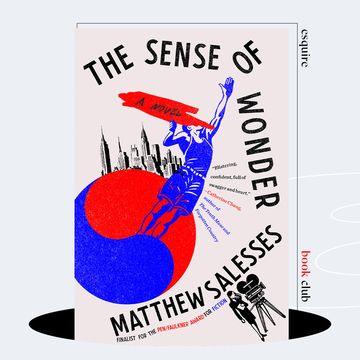“You never know about the people pulling the actual strings of life in America,” author Teddy Wayne tells Esquire, “because they’re completely out of sight.”
In Wayne’s newest novel, The Winner, these unseen kingmakers come into stark close-up—and the portrait is none too flattering. We see “the real winners of America” through the wide eyes of Conor O’Toole, a college athlete raised by working-class parents in Yonkers, New York. Fresh out of law school, Conor decamps to coastal Massachusetts for a luxurious summer: In exchange for tennis lessons, he’ll receive free lodging at a guest cottage on Cutter’s Neck, a gated oceanfront community for the grotesquely wealthy. He looks forward to a quiet summer of teaching tennis by day, then studying for the bar exam and applying for jobs by night.
But Conor has student loans to repay and an ailing mother to bankroll, so when a sharp-tongued divorcée named Catherine offers to pay twice his hourly rate for more than just tennis lessons, he can’t help but acquiesce. Soon enough, he tumbles into an erotic affair with Catherine that challenges everything he thought he understood about sex and power. Meanwhile, he’s falling for Emily, a young writer summering on Cutter’s Neck. Conor manages to juggle his romances and angle toward upward mobility, until he makes a horrifying mistake—one that threatens to punish him for his trespasses among the elite.
Gutsy and shocking, The Winner is a palm-sweating thrill ride through the lives of America’s winners and losers alike. Wayne spoke with Esquire by Zoom from his home in Brooklyn to discuss the myth of meritocracy, the role of sex in fiction, and the problems facing young men today.
ESQUIRE: Tell me where this book began for you, and how it took shape over time.
TEDDY WAYNE: There’s a place I know in Massachusetts that’s geographically very similar to Cutter’s Neck. Demographically, it has the same basic contours of old-money WASPs, although the Cutter’s Neck residents are far more materialistic and WASP-y than the people at this other place. I’d always wanted to set a novel there, but I didn’t know what that novel would entail until the pandemic came. I spent some time there during the pandemic, and I saw that the 1 percent of the 1 percent can really live very differently from everyone else. With the pandemic raging in the background, it suddenly made sense as a place to explore the differences between the haves and the have-nots, the winners and the losers of America. It’s not a so-called pandemic novel, though. It’s not front and center in every scene, but it sets in motion some of the plot, and more importantly, it’s the thematic undercurrent. Some people got to live in summer houses during the pandemic, but other people had to work in warehouses.
Now that we’re a few years into it, how do you think the pandemic has changed fiction?
There’s a certain kind of pandemic novel that’s emerged as a mini genre: A group of friends or family retires to a country house for safety, where they talk a lot and go over things that happened in the past, or maybe some problems that have cropped up recently, but clearly the big problem is the pandemic. It doesn’t make for a very exciting novel. No offense to these novels, of course, but you need people to be in the same room with each other for fiction to work. That’s a kind of novel that’s best avoided, I believe. I certainly don’t want to read about that—I already had to live through it. If I was going to write a novel set during the pandemic, I would want to make it exciting and retain some of the parameters of normal fiction, meaning people interacting. The only way I could imagine doing it was to set it in this insulated bubble where everyone is pretty much safe. It still lurks in the background as a paranoid anxiety, but no one gets Covid in the entire novel.
One of my favorite elements of the novel is its very specific taxonomy of how the rich live. For example, I love Conor’s observation that the shabby-looking furniture in wealthy people’s homes is actually very expensive and generations old. How did you become fluent in the quirks of the ultra-wealthy?
Half of my wife’s family is from this world; the other half is decidedly not. So through her, I’ve been exposed to the value systems and cultural signifiers of real old money, one of which is, yes, your furniture. Old-money WASPs generally eschew new-money flash as gauche, so they’d much rather have furniture from three hundred years ago that’s falling apart than something new from Crate & Barrel that costs a lot but ultimately is still mass-manufactured. Nowadays that’s changing. That world is disappearing, and it’s being replaced by gaudy McMansions like the one that Emily’s father built over his old family home. That represents a turn to this garish new money that’s more about flash than authenticity and oldness.
While I was writing The Winner, I thought a lot about Paul Fussell’s book Class, in which he delineates the nine strata of American social classes. At the very top is the out-of-sight rich. These are not the people who would ever be on a reality show. These are not the Kardashians. These are people like Harlan Crow, whom we only heard about because of the Clarence Thomas scandal. But otherwise, you never know about the people pulling the actual strings of life in America because they’re completely out of sight. These are the people that Conor is now mingling among—the people whose money has removed them from what we normally think of as the flashy rich.
How were you thinking about the tension between new money and old money as you wrote this book? How did it drive the story?
Well, Conor himself is working class, so any kind of money would be welcome to him, but he’s obviously going to be part of the new money if he ever gets rich. There’s a certain kind of security that this old money gives you, which is that it’s been in your family forever and will therefore last forever. But it’s also about people. Your ancestors built that wealth, and so the younger people in the book have a stranger relationship to money than their parents do—they recognize they’ll never surpass what their great-great-great grandfather did in the 1800s to build a shipping empire. That has a deleterious effect on ambition. It makes them feel like they can’t ever possibly compete, so why bother? But it also casts a certain shade on hard work, because it almost looks tacky to keep trying to get ahead when you’re already so far ahead. It leaves the young people without many options for what to pursue in life. They can’t pull themselves up by their bootstraps because they don’t need to, and it would look gauche if they were to do so.
I love the book’s perverse psychology of how hard work becomes eroticized. For example, we see Emily getting turned on when Conor fixes her faucet.
I mean, that’s the other real problem I remember hearing about. The Kennedys wanted to make sure their kids were all outdoorsy. They were all sent to camp to become self-sufficient, because the family was afraid their kids would become slovenly members of the aristocracy who couldn’t do anything for themselves. Of course, it’s come back to haunt them; I feel like they take too many risks in the outdoors and tragic things happen to them. But that’s the danger of having everything done for you—you just can’t do anything for yourself. Someone was telling me about how they used to work for very rich people who didn’t know how to work their own dishwashers. Someone else I know worked for a very wealthy woman and her husband, and the guy would get scared going outside in New York City; he wouldn’t know how to use elevators. At a certain point, having everything done for you renders you completely inept to survive in the world.
At certain points in the narrative, you dip into Conor’s head to show us how he thinks about the link between tennis and ambition. You write, “In this expensive, gentlemanly sport, Conor had developed a vision of himself as a scrappy grinder who had blazed an unheralded path to success.” What’s the relationship between tennis and bigger ideas about meritocracy?
Conor is what’s known in tennis as a pusher: He’s a defensive player who gets by through consistency and not making mistakes. He’s always played against rich kids, because tennis is a sport for rich kids who are much more concerned with hitting winners—with being winners—and dominating through power. He’s figured out this loophole: “I can get by with grit and scrappiness and therefore make it.” He believes that this is a path to success in America: that hard work and some talent will get you wherever you want to go. Over the course of his summer at Cutter’s Neck, he comes to recognize that, yes, it can get him to a certain place, but he’ll never get to where these people are. There’s a gap he can never traverse, no matter how hard he works or how talented he is. That’s the true difference between the real winners of America, whom he didn’t even know about before this, because they’re always out of sight, and the losers like him—the people who, no matter what, will always be outside the window trying to get in.
There’s been a lot of ink spilled about how younger readers are resistant to sex scenes and don’t find them narratively fruitful. I’d love to put this book in their hands and see what they have to say. What’s your response to readers who feel that aversion to sex on the page?
I used to think that when you’re younger, watching sex or reading about sex was the most fun part about being exposed to art, because you probably weren’t having it yourself. You could see what it’s like by proxy. So it’s hard for me to understand how a twenty-one-year-old wouldn’t be interested in hearing about it or reading about it. I try not to make the sex gratuitous, because I don’t think that serves a function, but sex scenes can propel the story forward and reveal character. I’m not interested in shock value for the sake of it, but I’m interested in sex as a window into characters’ minds—especially Conor, who, for a twenty-five-year-old guy, is not that driven by sex until he starts experiencing it with an older woman.
When I was young and reading literature, especially in adolescence, I viewed it very much as a sneak preview of adulthood. I was excited to learn about how adults operated and talked and did things behind closed doors. It’s surprising to me that younger people wouldn’t be interested in seeing how older people, either the characters on the page or even older authors, might show them a glimpse of the future that awaits them.
After all that reading, did adulthood live up to your expectations?
No. It’s all been a disappointment ever since. I was lied to by Hemingway.
When I look at your body of work more broadly, it occurs to me that you’re something of a prophet of young men, especially the disaffected ones. Why do you think you’re drawn to these kinds of characters?
I’ve always been interested in the lone wolves of fiction, from Travis Bickle to Tom Ripley. There might be something wrong with these characters, but their alienation is the root of their problems. I’m not the kind of person who’s going to write a saga about a family reuniting for one last Christmas and the problems that develop therein and how they relate to what happened when they were kids. The guy I’m going to write about is the one who didn’t get invited to his family’s Christmas and is spending the holiday alone wandering the streets of New York. That’s always felt more artistically exciting to me. I’m interested in those people in real life, too. I’m more fascinated by the weirdo in the corner of the party than the person in the middle telling jokes to everyone. Those have been the most artistically meaningful experiences I’ve had. Seeing those characters experiencing something about society through their prism has always been, for me, the most interesting way to make sense of America or the world.
This is a big, thorny question, but it’s one we think about every day at Esquire, so I’d love to hear your perspective on it. What do you think is going on with men nowadays? Why are we living through a so-called crisis of masculinity?
There are a bunch of reasons. Obviously, the leveling of the playing field has made some of them discomfited. Previously, some white men might have coasted because there was less competition; now they have to compete against women, people of color, and so on. Then suddenly it’s not quite the cakewalk it once was, so they react negatively to that. I also blame the Internet for most of our ills. I think pornography, social media, sports, gambling, and video games have all contributed perniciously to young men’s mental health and their ability to get out into the world and do things. It shouldn’t be in our DNA to sit at home all day in front of a screen, as most of us do.
I had an adolescence and childhood away from most of that, so I was able to see that life is worth living away from your computer. But I think someone raised now will have a harder time separating himself from his screens and recognizing that it’s more fun to go to a party and talk to people, as scary as it might be, than it is to sit at home texting them or writing to them in a chat forum. Obviously there are benefits to people who maybe can’t get out or are afraid to do so. If you look at any current TV show depicting young people, a good 10 percent of scenes are people looking at their phones. It makes for dramatically inert TV as well as fiction. But it’s because we live dramatically inert lives these days.
There’s no shortage of fiction about these disaffected white men. Not just modern fiction—it’s a genre as old as time. But as we live through this moment for men, and as writers like you are writing about it, do you see an emerging canon of this masculinity crisis?
It does seem to be cropping up more in the past few years, with more books tackling this head-on. I have not read that many of them myself, but I see that they exist. I think it makes sense that someone of that younger generation would want to write about it, and it also make sense as to why it might be harder for them to write about it. Do they embrace these changes, or do they criticize them? Maybe a little distance is required to dispassionately observe. And if you’re a twenty-eight-year-old straight white male writing literature these days, I’m not sure what you’d write about, because you’re going to hit a lot of third rails, or you’re going to sign on to all the orthodoxies that you’re supposed to and look like you’re just passively accepting everything. These days, it’s harder and harder for a genuinely rebellious, non-alt-right writer under thirty-five to write something meaningful. I’m glad I didn’t publish my first novel until I was thirty-one. A little distance from one’s twenties is usually required to write about one’s twenties, I’ve found.
I know that you’re adapting this novel for the big screen. What’s that been like so far?
It’s been fun. I’ve done it for five of my six books now, which are each in varying stages of development. I find it very enjoyable. I don’t get upset about it the way some people do, where they feel like they’re destroying their baby. I’m not precious about it. I recognize the need to transmute it to a different medium. I’ve always adapted my own work, though there will surely be rewrites from other people involved in the process.
Do you find that you can remain detached when other people get involved?
That will probably be harder, but I think as long as I could cash the check, I’d shut up about it.





